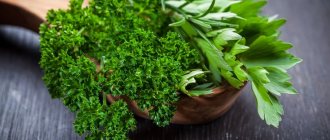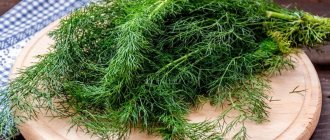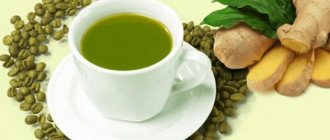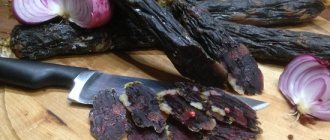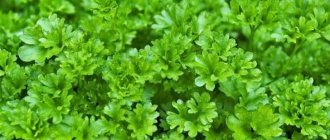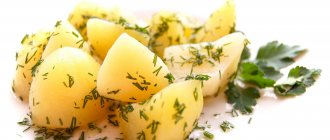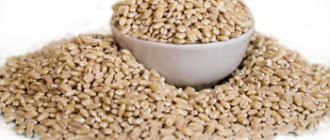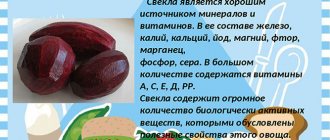Parsley
Parsley contains vitamins C, E, B, beta-carotene and also 8 minerals: calcium, magnesium, phosphorus, zinc, iron, fluorine, selenium and potassium. Moreover, there is so much potassium in parsley that it is definitely recommended for everyone who suffers from heart, kidney and bladder diseases - after all, potassium removes excess water and sodium from the body.
Other benefits of parsley:
- It improves hematopoietic processes, reduces gum bleeding;
- Parsley seeds have a diuretic and anti-inflammatory effect;
- Parsley is one of the best aphrodisiacs for men, for which it is often called the “green Viagra”. The effect of taking it occurs the very next day;
- Thanks to B vitamins and flavonoids, drinking parsley decoction reduces blood pressure;
- Selenium in parsley resists cancer processes;
- Parsley lowers blood sugar levels;
- Regular parsley masks rejuvenate and whiten the skin;
- If parsley masks are used to rub into the scalp, it helps stop baldness;
- Daily consumption of parsley (50g) allows you to always look fresh and young.
There is an opinion that parsley root is richer in nutrients than its green leaves. This is wrong. The green part of parsley, on the contrary, is more saturated with useful substances. Attention! The use of parsley is contraindicated for people with low blood pressure.
What are the benefits of dill and parsley?
1) Dill is a very healthy herb that improves the functioning of the digestive system.
2) Dill also helps digest fatty foods, relieves stomach pain, improves appetite, and has a choleretic effect
action, increases the secretion of gastric juice, soothes colic, weakens bloating.
3) It is very useful to use dill for overweight people with salt deposits and also for diabetics.
4) This useful herb helps with hypertension, angina pectoris, heart rhythm disturbances, atherosclerosis, perfectly calms, helps with insomnia.
But in large quantities it is contraindicated during pregnancy, as well as with low blood pressure.
Healing properties of parsley:
- leader in vitamin C content, it is three times more than in lemons;
- contains much more phosphorus, calcium, iron than any vegetables;
- improves appetite, digestion, stimulates the release of digestive enzymes;
- cleanses the body, urinary tract, liver, kidneys;
- has a diuretic effect;
- useful for edema, hypertension;
- copes with inflammatory gum diseases, freshens breath;
- indispensable for gastritis with low acidity and indigestion.
Men, lean on parsley; it contains substances that prolong erection.
But parsley should not be consumed during pregnancy or when kidney diseases worsen.
Dill
Dill contains vitamins C, B1, B2, P, PP, beta-carotene, folic acid, as well as minerals: iron, potassium, magnesium, calcium, phosphorus. Anyone who regularly chews fragrant dill sprigs is less likely to suffer from gastrointestinal disorders.
What else is dill useful for:
- Dill has an antiemetic effect;
- Dill helps with sleep disorders;
- Dill enhances lactation in nursing mothers;
- A decoction of dill herb can be useful for hypertension, cardiovascular failure, liver and biliary tract diseases;
- One of the main advantages of dill is its ability to eliminate flatulence, and it can be given for this purpose even to small children, in the form of a decoction;
- A decoction of dill herb has an anti-inflammatory effect - it is successfully used in the treatment of conjunctivitis;
- Dill has an auxiliary effect in the fight against headaches;
- Dill helps you lose weight and helps reduce excess weight - its microelements activate metabolism.
Using parsley and dill
Doctors strongly recommend daily consumption of fresh greens, regardless of the season. In winter, with a deficiency of vitamins and an increased risk of viral diseases, its relevance increases. In addition, a bunch of dill and parsley can alleviate illness or prevent it. It’s not for nothing that our ancestors valued these plants primarily as medicine, and only then as seasoning.
Important! The freshness of the greens will remain longer if you lightly sprinkle the unwashed branches with water, place them in a plastic bag and put them in the refrigerator. It is advisable to first remove yellowed and blackened stems from the bunch.
In cooking
The pleasant spicy aroma and specific taste of dill and parsley add piquancy to culinary dishes. These seasonings are often added in raw, dried, salted and frozen forms. It is typical that after heat treatment the herbal additive loses its aroma, so it is used after turning off the heat. These seasonings go harmoniously with any dish. They can be combined with cold and hot dishes, fermentation, pickling, marinades, casseroles, teas and even confectionery (used for flavoring).
Young dill and parsley stalks are most popular among housewives. They are consumed fresh. And when the plant enters the flowering phase, its foliage and umbrellas are added to the preservation. The phytoncides contained there not only have a positive effect on the taste of the product, but also prevent the formation of mold in the jars. Dried herbs are often mixed and added to soups, porridges, meat and fish dishes in winter.
At home, subject to the technology of collecting plant materials, you can prepare mixes for every taste. An aromatic tea is prepared from dill seeds. It has a specific taste and has a beneficial effect on the functioning of the digestive tract. Parsley root is indispensable when stewing potatoes. It is also added to vegetable stews and meat dishes, thanks to which they acquire a special piquancy in taste.
Important! Pregnant women should limit the amount of parsley and dill they consume, as it stimulates the contraction of the uterine and gastric muscles.
On an industrial scale, dill essential oil is used in the production of alcoholic beverages and canned goods. Regarding parsley in this aspect, there is a ban in Russia. Since 2011, Rospotrebnadzor has publicly declared the curly variety (Petroselinum crispum AW Hill) to be unsuitable for consumption as food, as well as for the manufacture of dietary supplements due to the “narcotic and toxic substances” it contains.
Although in almost all European countries, with the exception of Scandinavia, as well as in America, Africa and the Far East, the product is widespread and is an integral culinary ingredient. Based on the intentions of government agencies to remove parsley from sale and the agricultural sector, many consumers began to doubt whether its stems could be eaten. The department responded to the concerns of society with a comment about the harmfulness of exclusively the seeds of the plant.
Did you know? In Ancient Greece, winners of competitions were awarded laurel and dill wreaths, and a bouquet of
dill could be given to women. This gesture was regarded as a sign of great love and devotion.
In folk medicine
As a medicine, you can use fresh crushed branches, juice, infusions and decoctions. One of the founders of medical sciences, Avicenna, considered this raw material effective in the fight against hiccups. And modern folk healers recommend it for treatment:
- Pyelonephritis, urolithiasis and cholelithiasis.
- Organs of the gastrointestinal tract (teas and infusions from dill seeds, as well as fresh herbs of both plants are effective). For example, children with flatulence and colic are advised to prepare a decoction of dill seeds in a 1:2 ratio.
- Colds and acute respiratory infections. For gargling, it is recommended to prepare an infusion of 3 tbsp. l. chopped fresh stems of dill or parsley and a glass of boiling water. After combining these ingredients, you need to soak them in a water bath for about 15 minutes, then cool and strain.
- Liver diseases. Therapy consists of internal intake of teas, decoctions and the above-mentioned infusion. It is advisable to take 80–100 g of the product three times a day before meals.
- Insomnia. Before going to bed, it is enough to drink dill seed tea with a teaspoon of honey.
- Hypertension І-ІІ degree, headache, cardiovascular failure. To normalize blood pressure, you can limit yourself to taking an infusion or decoction of parsley internally. Drinking has a diuretic effect. It is important to observe the measure so as not to aggravate the situation. Parsley will help improve the condition of migraines.
- Inflammatory processes in the organs of vision. Lotions made from dill or parsley infusions are recommended.
- Skin diseases, ulcers, deep and poorly healing wounds. Problem areas should be treated with a decoction of high concentrations of parsley or dill. It is better to prepare it from seeds.
- Hemorrhoids. In these situations, it is effective to take an infusion of dill seeds, one third of a glass, three times a day.
In addition, parsley and dill can increase potency in men and lactation in women. This requires consuming as much fresh greens as possible, as well as drinking from seeds.
Video: dill in folk medicine
Celery
Celery does not have many fans - it has a strong taste and unique aroma.
It's a pity. Celery is one of the most valuable greens for health. Celery contains vitamins B1 and B2, C, E, K, carotene, in addition, minerals: potassium, sodium, iron, manganese, zinc, phosphorus. It has a cleansing effect on the body and helps you lose weight. Chopped celery root is used for food. You can also take celery juice - 1-2 teaspoons of juice 3 times a day 30 minutes before meals.
Other benefits of celery:
- Celery strengthens the heart;
- Due to its richness in vitamin C and carotene, celery is useful for visual impairment and is widely used in gynecology;
- Celery has a diuretic effect - it reduces blood pressure and relieves swelling;
- Celery removes excess uric acid from the body, so it is recommended for gout;
- It is also good to take celery when you are nervous – it has a calming effect on the nervous system.
Useful properties of dill
- Greens and dried dill leaves reduce blood pressure and normalize pulse . It is an indispensable remedy for hypertensive patients.
- Contains potassium , magnesium , sodium and a whole complex of various vitamins that are beneficial to health.
- Dill infusion is useful for bloating, diarrhea, stomach cramps and for improving digestion. Therefore, dill water and a weak decoction are given to infants for colic.
- Calcium , which is contained in the plant, has a beneficial effect on the strengthening and formation of the skeletal system, nails and hair.
- Fresh dill relieves the feeling of fatigue and gives a feeling of calm, relieves anxiety, and calms the nerves.
- The decoction is a good diuretic.
- Strengthens the immune system and helps fight infectious diseases.
- It freshens the breath ; it’s not without reason that many car enthusiasts like to chew dill the morning after a good evening; it perfectly removes fumes.
- In addition to the decoction, an extract from the seeds of the plant .
- It has a positive effect on the skin ; the decoction is used as a lotion for washing, and is also added to bathing water for babies.
- It is a good prophylactic against heart attack and heart disease.
- Thins the blood, reduces the risk of vein thrombosis.
- Most ointments against varicose veins are made on the basis of dill .
- Tones the skin and muscles.
- Has a slight laxative effect.
Cilantro
Cilantro is the tops of the plant.
Its seeds are called coriander. This spicy green is rich in vitamin C, carotene, and essential oils. In addition, cilantro contains vitamins A1, B1, B2. What else is cilantro useful for:
- purifies the air if planted in pots
- lowers blood pressure
- organizes the functioning of the cardiovascular system
- slows down the intoxication of the body
- increases appetite
- improves sleep
People with cholecystitis should not get carried away with cilantro.
How and where are these plants used?
Dill and parsley have found their use in pharmacology, cooking and folk medicine. Essential oils, extracts, lotions and medicines are made from dill. Also, with the help of this plant you can easily decorate or complement salads, sandwiches, meat, fish and almost any dish. Since ancient times, there have been many folk remedies using dill decoction; they drink it, breathe it, and use it as a lotion and ointment.
Parsley is mainly used in cooking . It has a specific smell and increases appetite. In addition, having a positive effect on many functions of the body, it strengthens the immune system. This plant is appreciated by all famous culinary schools, because dishes garnished with parsley look more aesthetically pleasing.
Dill and parsley
Basil
Basil is rich in carotene, rutin, contains vitamin P and a significant amount of essential oil, which has an antimicrobial effect. Basil helps get rid of headaches and insomnia, fights colds and improves brain function.
- Other benefits of basil:
- Has an antiseptic effect
- Reduces muscle spasm
- Improves the condition of skin, hair and nails
- Has a mild diuretic effect
- Relieves headaches
- Reduces the negative effects of stress, anxiety
Where to add parsley
In principle, it can be used for a variety of dishes:
♦ fish, meat and vegetables;
♦ in mushrooms, porridge, potatoes;
♦ smoothies, salads and filling for savory pies.
In addition, it can be used simply for decoration and at the same time receive valuable vitamins and minerals.
If you have migraines and frequent headaches, you should take it in moderation. The myristic content causes excitement of the nervous system, which can be just the impetus for the development of headaches.
You should not store greens in the refrigerator for a long time, only in freezers, but it is better to consume them during the day, immediately after cutting.
Selection and preparation of a landing site
Both parsley and dill are not picky about where they are planted. They grow well in both open and shaded areas. However, to obtain a better harvest, it is worth choosing the “golden mean” and planting plants in slightly shaded areas, but open to air circulation.
Note! An excellent place would be places next to spreading trees in the garden or vegetable garden.
Excessive sun can burn and dry out crop leaves and make them small with a yellowish tint. And strong shading and thickening will provoke rotting of the roots and the appearance of various pests and diseases.
Greens should be grown in a slightly shaded area
Another important criterion when growing both crops is the quality of the soil. Of course, dill and parsley can sprout and grow in any soil quality, but the juiciness and quality of the leaf blades may suffer.
Salads and oxalates
Article on the topic
Herbs for the heart: three recipes from calendula, hawthorn and lemon balm True, there is a problem with salads. “Many salads often contain large amounts of oxalates - oxalic acid compounds,” says Viktor Konyshev. - Most of them are in the sorrel itself. These substances form salts that are poorly soluble and can remain in the kidneys, contributing to the formation of oxalate stones.
This effect can be weakened by adding cream, sour cream, kefir, and yogurt to dishes. They contain a lot of calcium, which reacts with oxalic acid and prevents their absorption into the blood. True, this also reduces the absorption of calcium itself.”
